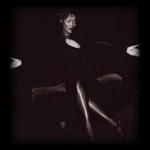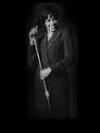Banner Airplay...
[From USA Today]
SHE LEARNED FROM THE BEST Houston's version of the
''Star-Spangled Banner'' has gotten lots of radio play
It's been much remarked in the wake of the events of September 11 that the song tapped to
inspire a sense of national unity -- from the mountains to the prairies to the Broadway
stage of ''The Producers'' -- has been ''God Bless America.'' It's also been noted that
our official national anthem, ''The Star-Spangled Banner,'' hasn't been much heard by
comparison, leading some commentators to wonder if it's on its way out. Oh, the Whitney
Houston version has been all over the radio, but how many people did you actually hear
singing it at the candlelight vigils?
I could have told you last June that ''Banner'' was on the outs, when I took my kids to a
Yankees game. Now, a baseball stadium has always been the one enjoyable place to belt out
the national anthem regardless of race, creed, or musical ability: The lyrics are
appropriately belligerent and the tune was swiped from an English tavern song (written
circa 1780 and titled ''To Anacreon in Heaven'' -- it's an erudite drinking song but a
drinking song nonetheless). My own youthful memories include not only the ''Jose, can you
see?'' joke but the image of Fenway Park in full barbaric yawp as tens of thousands of
grizzled Red Sox fans had their way with Francis Scott Key's words.
At last summer's Yankees game, though, hardly anyone sang. Oh, they stood and took off
their hats, and murmured the lyrics they knew, but mostly they watched the video of the
flag and listened to the singer (I forget who it was). At some point in the last decade,
it had become clear that the ''The Star-Spangled Banner'' wasn't for regular folks to sing
anymore. It was for Whitney Houston to pull out the vocal stops or for Rosanne to
desecrate or, reaching further back, for Hendrix to dismantle with love, irony, and
electricity.
Obviously, last June wasn't a time that called for patriotism. The days after September 11
were, though, and of an unusually intense, supportive sort. Which is why ''Star-Spangled
Banner'' seemed particularly out of place with its operatic range and lyrics celebrating
the pretty fireworks of war -- ''the bombs bursting in air.'' ''Banner'' only became the
U.S. national anthem in 1916, by the decree of President Woodrow Wilson as we were about
to enter World War 1. It's a sword-rattler, in other words, but a sword-rattler wasn't
what we needed on September 12.
That night I heard some people in my Brooklyn neighborhood singing ''America the
Beautiful'' -- a lovely and soothing song, but one that, in its focus on the country's
natural beauty, seemed a little besides the point. Too bad most of the singers only knew
the first verse, though; the third verse, which begins ''Oh beautiful for heroes proved/in
liberating strife/Who more than self their country loved,/and mercy more than life''
wouldn't have been out of place as we marched to the empty local firehouse.
Still, everyone across the country ultimately came around to ''God Bless America.'' Not
because it's short, and not because everyone knows the words. Not even because it avoids
Francis Scott Key's overwrought poesy for the simple, main-street sentiments of Irving
Berlin. Simply because it was the right song to sing for a confused, emotionally battered
country. Sing it to yourself: You don't have to be a patriot to be moved.
A final thought: There were private anthems, too -- songs that spoke to individual
sensibilities and calmed them or stoked their anger or just let them vent. We all go to
our inner jukebox at critical times, and it can be interesting what gets played. EW music
writer Tom Sinclair has already talked in this space about his inability to get an old
Frank Zappa song out of his cranial tape-loop Tom's Hot Topic. Others I know fled to
Mozart, or took solace in Bruce, or plumbed bluegrass roots. Me, I found myself digging
out my old vinyl copy of Paul Simon's ''There Goes Rhymin' Simon'' and putting the needle
down on ''American Tune.'' I knew the sentiment was in there somewhere -- words to match
the barbed wire in my stomach -- and the search paid off in the last verse:
''And we come on the ship they call the Mayflower/We come on the ship that sailed the
moon/We come in the age's most uncertain hours/And sing an American tune.
Oh, and it's all right, it's all right, it's all right/You can't be forever blessed/Still
tomorrow's gonna be another working day/And I'm trying to get some rest...''
That was my anthem. What was yours?
NEWSFILE: 3 OCTOBER 2001
|





